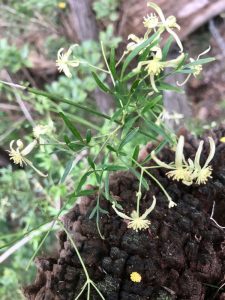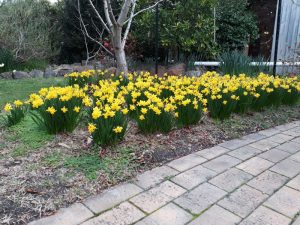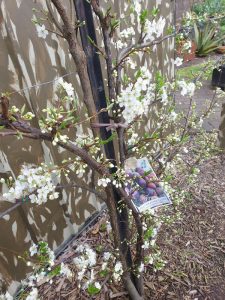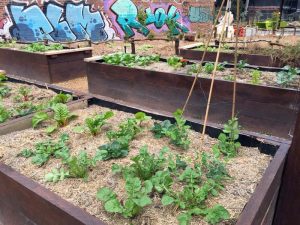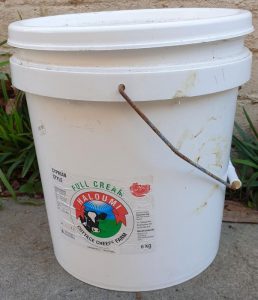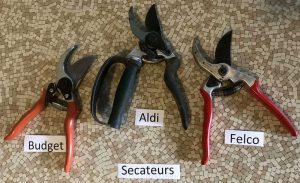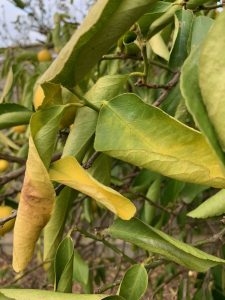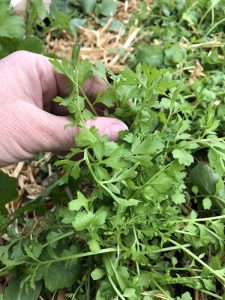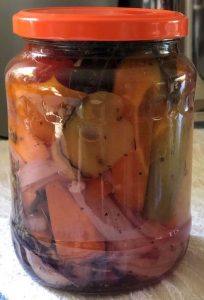Thanks to all the people who have contributed to this week’s newsletter: Ally Shepherd, Amanda Coombes, Angelo Eliades, Choon Yin Yeok, Choy Lai, Christine Kay, Doris Glier, Dorothy Kwak, James Petty, Jill Renison, Lee Hirsh, Lucinda Flynn, Mala Plymin, Megan Goodman, Nada Cunningham, Pauline Webb, Robin Gale-Baker, Soo Mei Leong and Stuart Rodda.
How to plant seeds in punnets (by Robin Gale-Baker)
[Robin, from Sustainable Macleod writes a regular monthly column for this newsletter. A longer version of the material below can be found on our website.]
It’s time to plant seeds in punnets for the spring veggie and flower garden. A seed is essentially a hard outer covering with an embryo inside and your job is to allow that embryo to develop in prime conditions. This article provides some tips for optimum results.
Select an Australian Standards seed raising mix (and later a potting mix). Never use garden soil in punnets as it is too heavy and compacts. Seed raising mix is much finer than potting mix and, when firmed down, prevents small seeds falling through the mix and disappearing out the drainage holes. It also doesn’t contain much in the way of nutrients which is a good thing as you do not want your seedlings growing too fast and crowding as this leads to ‘damping off’ whereby your seedlings collapse due to pathogen growth.
Fill your punnets with seed raising mix to 1cm below the rim. Using a second filled, watered punnet, place it inside the first punnet and use it as a weight to firm down the mix so it forms a flat seed bed and then water it well. For all seed types except for cucurbits (see next paragraph) and lettuce (see the following paragraph), sprinkle your seed onto this moist surface, cover with 1cm of soil (or whatever is suggested on the seed packet) and water again gently.
Cucurbit seeds, such as pumpkin, cucumber, zucchini and melon, are large seeds with a flattish surface. If laid in the punnet horizontally, water can pool on the upper surface of these seeds, causing rotting. Instead, plant these vertically into the seed bed with the pointy end upward, and cover with around 2cm of the mix.
Lettuce seeds germinate in light so they should not be covered with seed mix. Rather, prepare a firm, moist seed bed, sprinkle the seed onto this and press the seed down so that it connects with the moist bed. This means that, when it germinates and roots begin to emerge, those roots will be ‘in touch’ with the soil and able to penetrate it rather than laying along its surface.
When the seeds have germinated and the seedlings are at the 4 leaf stage (2 pairs of leaves), they are ready to transplant into seed trays. Use a good quality potting mix which will contain a balance of nutrients, drain freely and be more open allowing roots to develop unimpeded. When you transplant, take out a clump at a time and gently pull the roots apart. Hold the seedlings by the leaves not the stem.
Most veggie seeds can be started in punnets but root vegetables are best planted direct into soil cultivated to a fine tilth.
Pole loppers (by Stuart Rodda)
[Stuart, from Eltham, has written numerous articles for this newsletter about garden tools. This article on pole loppers is one of a series of articles on cutting tools
To cut small branches off higher limbs of trees you can use a pole lopper, where the cutting blade is mounted on one end of the pole and the operating handle on the other. The transfer of force from the operating handle to the blade can be via a steel rod, a rope, or a plastic band.
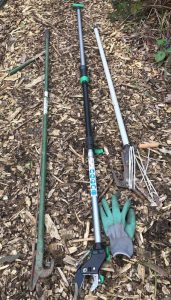 The photo shows the three types:
The photo shows the three types:
- A heavy green steel model, fixed length, with a hook/blade at the cutting end, using a lever connected to a steel pulling rod to exert maximum cutting force. This design has the advantage that the hooked end can be placed on the branch and will not slip while you concentrate on pulling the lever.
- A grey steel tube model, extendable in length and locked at the chosen length with a twisting motion, using a white plastic rope which pulls the cutting blade. Pole loppers operated by rope have the huge disadvantage that the rope tends to get caught in branches or twisted around the pole in use.
- A square extendable aluminium tube model from Aldi which uses flat plastic bands to transfer the pulling force part way along the outside of the tube, and an internal steel cable to operate the cutting blade. This design prevents snagging of the external pulling band or internal cable. The Aldi model can extend to around 3m in length, avoiding the need to climb on a ladder to reach the top of small trees for pruning. This is by far the best design due to its light weight and versatility. It is an Aldi special which means it only becomes available occasionally (but similar models exist at Bunnings at higher prices).
For the cutting of larger diameter wood from ground level in hard-to-reach places and at greater heights, saws, including pole-mounted chainsaws, offer a cheap and convenient alternative to hiring a professional arborist. (Saws will be covered in a separate article.)
How to make your own mini greenhouse (by Lucinda Flynn)
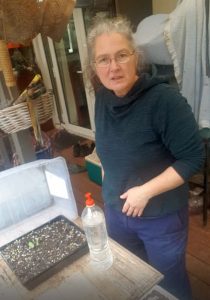 Lucinda, from Hurstbridge, has made a short (1 minute) video for this newsletter on how to make you own mini greenhouse. Watch the video.
Lucinda, from Hurstbridge, has made a short (1 minute) video for this newsletter on how to make you own mini greenhouse. Watch the video.
Yes, you did know (sort of)
Last week, Louise Nolan asked if it was ok to compost her kitty litter after solarising it. Several of you have replied.
Angelo Eliades: “Pet litter, either dog or cat, should never be used in regular composting systems under any circumstances. It should never be used at any stage of breakdown in any garden beds, especially where produce is being grown. The poop carries lots of pathogens and it’s not viable to sterilise it in any way for handling as a garden soil amendment material. It should therefore never be put into a compost bin that needs to be emptied, or mixed into soil that will be dug or handled. The only safe disposal method that would recycle the material is to dig it deep into the soil in areas that aren’t disturbed, such as unused areas, areas under trees (don’t cut into their roots) or mulched garden paths away from veggie garden beds.“
Jill Renison: “I have a similar problem which I have not satisfactorily resolved as yet. Cats carry toxoplasmosis, which can infect other animals. I used to flush cat poo down the toilet, but stopped when I read that sea creatures, such as otters, can be infected by doing this. I keep all cat waste products well away from my compost bins and food gardens. I used to put the urine-soaked recycled paper waste pellets on a non-productive part of the garden, but they take forever to decompose and are unsightly. You can buy special composting buckets for animal waste that you partially bury in the garden, but this doesn’t solve the problem of the used litter.“
James Petty: “I can’t answer your question about solarising the kitty litter but I have been running a little experiment composting my dog’s poo. It goes in a separate small compost bin that I picked up off the street along with a carbon material (straw, dried leaves/grass clippings, sawdust), and regular watering to keep it moist. Plus an occasional shovel-load from my normal compost. It works extremely well (see photo)! The issue of using it on the garden never arises because it breaks down so quickly the bin never fills up.“
Yet more on contaminated compost
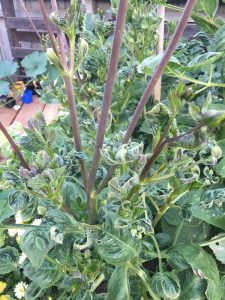 A couple of weeks ago, Louise Nolan discussed how many of her tomato plants had died after using contaminated compost and cited an ABC article on the subject. Ally Shepherd has now written in: “I experienced a very small amount of soil contamination in my summer crops last year which caused plant deformation and leaf curling (see the photo of my dahlias). After reading the ABC article, I joined the Soil contamination Victoria’ Facebook group, which has become an interesting resource for me. I am still a young gardener so, before I worked out that it was soil contamination, I actually chopped the curled parts off my dahlias and sunflowers which were producing deformed flowers and the new growth actually looked like normal. I have been improving the soil this year so it will be interesting to see if my crops this summer will still be affected.“
A couple of weeks ago, Louise Nolan discussed how many of her tomato plants had died after using contaminated compost and cited an ABC article on the subject. Ally Shepherd has now written in: “I experienced a very small amount of soil contamination in my summer crops last year which caused plant deformation and leaf curling (see the photo of my dahlias). After reading the ABC article, I joined the Soil contamination Victoria’ Facebook group, which has become an interesting resource for me. I am still a young gardener so, before I worked out that it was soil contamination, I actually chopped the curled parts off my dahlias and sunflowers which were producing deformed flowers and the new growth actually looked like normal. I have been improving the soil this year so it will be interesting to see if my crops this summer will still be affected.“
The community gardens at Collingwood Children’s Farm
Some of you may know that there is a large community garden at Collingwood Children’s Farm, which dates back to 1979 and is mainly comprised of allotments. You may also be aware that the farm recently closed the community garden, ostensibly for safety reasons. If you want to read how the closure has played out in the media, google ‘collingwood childrens farm community garden’ and choose the news option.
Anyhow, newsletter Mark Sanders has recently posted two important articles about the closure on the Moreland Food Gardens Network website. The first article, entitled protecting public land: why we’re refurbishing the community gardens at the Collingwood Children’s Farm, is by a member of the Committee of Management for Collingwood Children’s Farm. The second article, entitled protecting public participation: why gardeners are protesting their exclusion from the Collingwood Children’s Farm Community Gardens, is by two of the community garden’s gardeners.
The photo competition
Last week’s competition
The theme was ‘springtime’ and we had 17 entries. The winner, as judged by our ad hoc panel, was Choon Yin Yeok’s photo of her front garden.
 This week’s competition
This week’s competition
As we are still in lockdown, we are going to have another photo competition. The theme this week is ‘colour’: your photo’s subject(s) can be either animate or inanimate but they have got to be colourful! In the right composition, black or white can also qualify as colourful.
To get you started, the photo right is of a flower of my queen’s-tears (Billbergia nutans).
Email your photos, including the names of any of the plants or animals featured and, if appropriate, some words about the photo.
What seeds to plant in September
Here is a list (see the planting guide for more detail):
CucurbitsCucumber |
Other warm season veggiesBasil |
Leafy greensLettuce |
RootsBeetroot |
Other veggiesAsparagus |
It’s Spring time! Time to get planting! I try and plant all my warm season veggie seeds in September – that way, if they fail to germinate, I can try again in October.
Helen Simpson has previously written growing guides for many of the warm season veggies, namely: basil, chilli, cucurbits and tomatoes. Robin Gale-Baker has previously written about how to grow eggplants and capsicums and tomatoes. And Helen has written more generally about Spring veggie garden preparation.
Meg’s garden this month
I woke up this morning to the sight of a very large tree uprooted, its extended heavy branches taking out two vegetable beds, my apricot and blood plum trees. It is with some sadness that I start to cut and remove the mess and repair the damage. However, I now have three new planting holes for new bare-rooted stock that will hopefully over time provide fruit for the kitchen. It is not too late to find bare-rooted fruit trees, berry canes or vines.
With the loss of the tree, I now have far more light reaching the veggie garden beds. It is time to start preparing for the new season of plantings. The spent winter brassicas are removed and the beds are dug over and top-dressed with compost. I spend some time supporting and tying in the broad beans as they start to hit their stride.
While the end of the winter crops are being removed, my citrus trees just keep on giving, with oranges and mandarins abundant. Boxes of citrus sit outside the front gate for passers-by. I could do a lockdown citrus walk of our neighbourhood and count the signs for ‘free lemons’. I have so many mandarins that I have made a mandarin version of this marmalade as well as the usual orange (substitute about 10-15 small mandarins). At this time of year, any recipes that use citrus fruit are welcome.
Marmalade
5 oranges
1 lemon
1 litre of water
1Kg jam-setting sugar
(Note: you can use normal sugar, but you then need to cook the marmalade for longer).
Wash the fruit and cut very finely, removing the seeds. Place the fruit into a bowl and cover with water then leave overnight.
Add the fruit and water to a heavy based saucepan, bring to boil then simmer for about 1 hour.
Add the sugar and stir until dissolved. Bring to boil for about 10-15 minutes then test the consistency on a cold plate or surface.
Seal in sterilised jars.
Read more of Megan Goodman’s recipes on our website.
In case you missed them …
Here are some of the articles from the past month’s newsletters:
- Pantry food containers: glass or plastic? (by Angela Chung).
- White shahtoot mulberry (by Jaimie Sweetman).
- Persian land cress (by Katrina Forstner).
- Romanesco (by Kayla Blackmore).
- Soil acidity (by Rebecca Haschek).
- Secateurs (by Stuart Rodda).
- Loppers (by Stuart Rodda).
Which link was clicked most times in the last newsletter?
The most popular link last week was the animated Peter Rabbit film from the United Nations.
Proverb (or phrase) of the month
Easy as pie. Meaning: very easy. This phrase is of mid-19th Century American origin and the easiness comes from the eating rather than from the making. Piece of cake has a similar meaning and for similar reasons.
There are many similes in English that have the form ‘as X as Y’, where some property X is being highlighted together with an example Y of something that is supposedly well known to display that property. Here are some food-related examples:
As alike as two peas in a pod.
As American as apple pie.
As brown as a berry.
As cool as a cucumber.
As dead as mutton.
As different as chalk and cheese.
As difficult as nailing jelly to a tree.
As dry as a bone.
As flat as a pancake.
As happy as a clam.
As keen as mustard.
As mild as milk.
As nutty as a fruit cake.
As red as a beetroot.
As sure as eggs is eggs.
As sweet as a nut.
As sweet as pie.
As useless as a chocolate teapot.
As warm as toast.
Read about more food-related proverbs.
Gardening quote of the month
“Keep love in your heart. A life without it is like a sunless garden when the flowers are dead.” by Oscar Wilde.
Joke (or pun) of the week
A sandwich walks into a bar. The barman says “Sorry we don’t serve food in here.“
Upcoming events – introduction
Website calendars by type of event: All once-off events, Cooking, Everything else, Garden tours, Free.
Website calendars by Council area: Banyule, Boroondara, City of Yarra, Darebin, Manningham, Maroondah, Moreland, Nillumbik, Whitehorse, Whittlesea and Yarra Ranges.
In the lists below, events costing $10 or less are in bold.
For Covid-related reasons, some of the events below may have been cancelled, deferred or moved online.
Upcoming events – not cooking
Newly announced
- Edible weeds walk: Saturday, 9th October, 10.30am-12.30pm; $25 ($13 per hour); Brunswick East.
- Edible weeds walk: Saturday, 9th October, 1.30-3.30pm; $25 ($13 per hour); Brunswick East.
- Produce in pots: Thursday, 14th October, 6.30-9pm; $55 ($22 per hour); Bulleen Art and Garden.
- Flavours of Coburg food tour: Saturday, 16th October, 10am-1pm; $49 ($16 per hour); Coburg.
- Growing great tomatoes: Saturday, 16th October, 10am-3pm; $110 ($22 per hour); CERES.
- Introduction to growing microgreens: Saturday, 16th October, 10am-3pm; $110 ($22 per hour); Preston.
Cancelled
Obviously, all the planned events between now and 2nd September will no longer happen because of the lockdown.
Also cancelled are the various beekeeping events in Camberwell, namely Beekeeping for beginners on 4th September and Beekeeping – beyond the basics on 11th September. Plus urban foraging on 4th September in Forest Hill.
September
- Complete urban farmer (14 sessions): starting Friday, 3rd September, 9am-3pm; $880 for ACFE eligible participants ($10 per hour); CERES.
- Sri Lankan cooking class: Friday, 3rd September, 1-3pm; $90 ($45 per hour); Surrey Hills.
- Beeswax wraps with Emma Grace: Friday, 3rd September, 7-9pm; $75 ($38 per hour); Surrey Hills.
- The art of espalier: Saturday, 4th September, 9.30am-midday; $55 ($22 per hour); Bulleen Art and Garden.
- Flavours of Coburg food tour: Saturday, 4th September, 10am-1pm; $49 ($16 per hour); Coburg.
- Organic vegetable gardening: Saturday, 4th September, 10am-3pm; $220 ($44 per hour); CERES.
- Bakery Hill whisky distillery tour and tasting: Sunday, 5th September, 2-3.30pm; $59 ($40 per hour); Bayswater North.
- Farmers market workshop series – distribution and logistics: Tuesday, 7th September, 10-11.30am; $35 ($24 per hour); Alphington.
- Seed saving workshop: Saturday, 11th September, 10-11.30am; free; Whittlesea.
- Nutrition gardening with Donna Livermore: Saturday, 11th September, 10am-3pm; $75 ($15 per hour); Edendale.
- Edible weeds walk and talk: Saturday, 11th September, 2-4pm; free; Lilydale.
- Bakery Hill whisky distillery tour and tasting: Sunday, 12th September, 2-3.30pm; $59 ($40 per hour); Bayswater North.
- Sri Lankan street food experience: Sunday, 12th September, midday-2.30pm; $89 ($36 per hour); Fitzroy.
- Food forest gardening: Thursday, 16th September, 11am-midday; free; Edendale.
- Veggie gardening for beginners: Thursday, 16th September, 6.30-9pm; $55 ($22 per hour); Bullen Art and Garden.
- Beginning beekeeping course: Saturday, 18th September, 9am-4pm; $245 ($35 per hour); Edendale.
- Native edibles for companion planting: Saturday, 18th September, 9.30am-midday; $50 ($20 per hour); Bulleen Art and Garden.
- Flavours of Coburg food tour: Saturday, 18th September, 10am-1pm; $49 ($16 per hour); Coburg.
- Starting spring and summer veggies from seed: Saturday, 18th September, 1.30-3.30pm; starting-spring-and-summer-veggies-from-seed; Edendale.
- Wicking beds (two days): Saturday, 18th September 10am to Sunday, 19th September 3pm; $220 ($22 per hour); CERES.
- Bakery Hill whisky distillery tour and tasting: Sunday, 19th September, 2-3.30pm; $59 ($40 per hour); Bayswater North.
- Farmers market workshop series – the process of food business registration: Tuesday, 21st September, 10-11.30am; $35 ($24 per hour); Alphington.
- Healthy productive compost and worms: Saturday, 25th September, 9.30am-midday; $50 ($20 per hour); Bulleen Art and Garden.
- Chooks 4 kids and families: Saturday, 25th September, 10-11.30am; $15 ($10 per hour); Edendale.
- Bakery Hill whisky distillery tour and tasting: Sunday, 26th September, 2-3.30pm; $59 ($40 per hour); Bayswater North.
- The joy of backyard chooks: Thursday, 30th September, 6.30-9pm; $50 ($20 per hour); Bulleen Art and Garden.
October
- Flavours of Coburg food tour: Saturday, 2nd October, 10am-1pm; $49 ($16 per hour); Coburg.
- Know and grow heirloom tomatoes with Penny Woodward: Saturday, 2nd October, 1.30-3pm; $5; Edendale.
- Beekeeping workshop: Saturday, 2nd October, 2-4.30pm; $85 ($34 per hour); Brunswick East.
- Edible weeds: Sunday, 3rd October, 10am-midday; $50 ($25 per hour); CERES.
- Beginners backyard beekeeping: Saturday, 9th October, 10am-3pm; $220 ($44 per hour); CERES.
- Soil prep for summer veggies: Saturday, 9th October, 10.30-11.30am; free; Whittlesea.
- Design a permaculture garden with Lucinda & Jules: Sunday, 10th October, 9am-midday; $45 ($15 per hour); Edendale.
- Growing nutrient dense food: Sunday, 10th October, 10am-3pm; $110 ($22 per hour); CERES.
Upcoming events – cooking
Newly announced
- The art of salad making: Tuesday, 7th September, 7-8.30pm; $30 ($20 per hour); Hawthorn.
- Sourdough bread baking: Saturday, 16th October, 9am-5pm; $180 ($23 per hour); CERES.
- Indian cooking: Sunday, 17th October, 10am-3pm; $110 ($22 per hour); CERES.
- Truffle workshop at Ratio Cocoa Roasters: Sunday, 17th October, 11am-12.30pm; $75 ($50 per hour); Brunswick.
- The ultimate biscuit class: Tuesday, 19th October, 10am-3pm; $160 ($32 per hour); Blackburn.
Cancelled
Obviously, all the planned events between now and 2nd September will no longer happen because of the lockdown.
September
- Rosa’s Friday traditional Italian cooking class: Friday, 3rd September, 6-10pmpm; $155 ($39 per hour); Bundoora.
- Seasonal ferments: kimchi + kombucha: Saturday, 4th September, 9am-11.30pm; $95 ($38 per hour); Brunswick East.
- Sourdough bread workshop: Saturday, 4th September, 9am-11.30pm; $165 ($66 per hour); Brunswick East.
- Fermented vegetables: Saturday, 4th September, 10am-1pm; $85 ($28 per hour); Kinglake.
- Cooking dumplings: Saturday, 4th September, 10am-1pm; $50 ($20 per hour); Bayswater North.
- Gnocchi making class: Saturday, 4th September, 10am-1.30pm; $125 ($36 per hour) including lunch; Thomastown.
- Rosa’s Saturday traditional Italian cooking class: Saturday, 4th September, 10.30am-2.30pm; $155 ($39 per hour); Bundoora.
- Chocolate discovery class: Saturday, 4th September, 1-2pm; $48 ($48 per hour); Yarra Glen.
- Feta and haloumi cheese making: Sunday, 5th September, 10am-4pm; $170 ($28 per hour); CERES.
- Rosa’s Sunday traditional Italian cooking class: Sunday, 5th September, 10.30am-2.30pm; $155 ($39 per hour); Bundoora.
- DIY kombucha: Saturday, 11th September, 10am-1pm; $80 ($27 per hour); Whittlesea.
- Raw food fundamentals: Saturday, 11th September, 10am-3pm; $110 ($22 per hour); CERES.
- Beginners bread making: Sunday, 12th September, 8am-2pm; $190 ($32 per hour); Abbotsford.
- Introduction to Bulgarian cuisine cooking workshop: Sunday, 12th September, 11am-1pm; $65 ($33 per hour); Balwyn North.
- The ultimate biscuit class: Tuesday, 14th September, 10am-3pm; $160 ($32 per hour); Blackburn.
- Preserving: Saturday, 18th September, 9am-2pm; $70 ($14 per hour); Kinglake.
- Intro to fermenting at home: Saturday, 18th September, 10am-midday; $70 ($35 per hour); CERES.
- Beginners cheese making class: Saturday, 18th September, 10am-3pm; $180 ($36 per hour); Thomastown.
- Beginners bread making: Sunday, 19th September, 8am-2pm; $190 ($32 per hour); Abbotsford.
- Chinese cooking workshop: Sunday, 19th September, 10am-3pm; $10; Greensborough.
- Truffle workshop at Ratio Cocoa Roasters: Sunday, 19th September, 11am-12.30pm; $75 ($50 per hour); Brunswick.
- Sicilian cannoli: Sunday, 19th September, 2-4pm; $84 ($42 per hour); Fitzroy.
- Become a junior chocolatier: Wednesday, 22nd September, 4 occurrences stating at 9am, 10am, 11am and midday; $40 ($53 per hour); Yarra Glen.
- Good food, good mood with Joel Feren – live cooking demonstration: Wednesday, 22nd September, 11am-midday; free; Ringwood.
- Become a junior chocolatier: Thursday, 23rd September, 4 occurrences stating at 9am, 10am, 11am and midday; $40 ($53 per hour); Yarra Glen.
- Nonna & Mum’s cooking class: Thursday, 23rd September, 7.30-10pm; $20 ($8 per hour); Thornbury.
- Chocolate discovery class: Sunday, 26th September, 11am-midday; $48 ($48 per hour); Yarra Glen.
- The ultimate biscuit class: Tuesday, 28th September, 10am-3pm; $160 ($32 per hour); Blackburn.
- Become a junior chocolatier: Wednesday, 29th September, 4 occurrences stating at 9am, 10am, 11am and midday; $40 ($53 per hour); Yarra Glen.
- Truffle and praline workshop: Wednesday, 29th September, 6-10pm; $180 ($45 per hour); Blackburn.
- Sourdough basics: Wednesday, 29th September, 6.30-9.30pm; $95 ($32 per hour); Fitzroy.
- Become a junior chocolatier: Thursday, 30th September, 4 occurrences stating at 9am, 10am, 11am and midday; $40 ($53 per hour); Yarra Glen.
October
- Sourdough bread workshop: Saturday, 2nd October, 9am-11.30pm; $165 ($66 per hour); Brunswick East.
- Indian dosa masterclass: Sunday, 3rd October, midday-2.30pm; $89 ($36 per hour); Fitzroy.
- The ultimate biscuit class: Tuesday, 5th October, 10am-3pm; $160 ($32 per hour); Blackburn.
- French cooking workshop: Thursday, 7th October, 6.30-8.30pm; $65 ($33 per hour); Balwyn North.
- Cheese making at home: Saturday, 9th October, 10am-2pm; $120 ($30 per hour); Kinglake.
- Growing and cooking with bushfoods: Saturday, 9th October, 10am-3pm; $110 ($22 per hour); CERES.
- Soft goat cheese curd and goat camembert cheese: Sunday, 10th October, 10am-4pm; $170 ($28 per hour); CERES.
- Sourdough breadmaking workshop: Wednesday, 13th October, 10am-1pm; $90 ($30 per hour); Surrey Hills.
- Middle Eastern cooking: Friday, 15th October, 6-9.30pm; $65 ($19 per hour); Park Orchards.
- Sourdough bread: Sunday, 17th October, 1.30-4pm; $55 ($22 per hour); Park Orchards.
In Richmond
- Street food of Asia: Friday, 3rd September, 2-4.30pm; $168 ($67 per hour); Richmond.
- Dumpling party: Saturday, 4th September, 10am-midday; $111 ($56 per hour); Richmond.
- Indian cooking master class: Saturday, 4th September, 2-5pm; $168 ($56 per hour); Richmond.
- Indonesian cooking master class: Saturday, 4th September, 6.30-9.30pm; $168 ($56 per hour); Richmond.
- Dumpling party: Sunday, 5th September, 10am-midday; $111 ($56 per hour); Richmond.
- Italian cooking master class: Sunday, 5th September, 2-5pm; $168 ($56 per hour); Richmond.
- Pizza making party: Sunday, 5th September, 6.30-8.30pm; $127 ($64 per hour); Richmond.
- Dumpling party: Thursday, 9th September, 6.30-8.30pm; $111 ($56 per hour); Richmond.
- Gnocchi in tutta l’Italia: Thursday, 9th September, 6.30-10.30pm; $105 ($26 per hour); Richmond.
- Pizza making party: Friday, 10th September, 2-4pm; $127 ($64 per hour); Richmond.
- Indian cooking master class: Friday, 10th September, 6.30-9.30pm; $168 ($56 per hour); Richmond.
- Dumpling party: Saturday, 11th September, 10am-midday; $111 ($56 per hour); Richmond.
- Chinese cooking master class: Saturday, 11th September, 2-5pm; $168 ($56 per hour); Richmond.
- Going native Australia: Saturday, 11th September, 6.30-9.30pm; $189 ($63 per hour); Richmond.
- Dumpling party: Sunday, 12th September, 10am-midday; $111 ($56 per hour); Richmond.
- Vegan cooking master class: Sunday, 12th September, 6.30-9.30pm; $189 ($63 per hour); Richmond.
- A seafood feast: Tuesday, 14th September, 6.30-10.30pm; $105 ($26 per hour); Richmond.
- Dumpling party: Thursday, 16th September, 6.30-8.30pm; $111 ($56 per hour); Richmond.
- La cucina della Puglia: Thursday, 16th September, 6.30-10.30pm; $105 ($26 per hour); Richmond.
- Japanese cooking master class: Friday, 17th September, 2-5pm; $189 ($63 per hour); Richmond.
- Chinese cooking master class: Friday, 17th September, 6.30-9.30pm; $168 ($56 per hour); Richmond.
- Dumpling party: Saturday, 18th September, 10am-midday; $111 ($56 per hour); Richmond.
- Thai cooking master class: Saturday, 18th September, 2-5pm; $168 ($56 per hour); Richmond.
- Street food of Asia: Saturday, 18th September, 6.30-9pm; $168 ($67 per hour); Richmond.
- Dumpling party: Sunday, 19th September, 10am-midday; $111 ($56 per hour); Richmond.
- Vietnamese cooking master class: Sunday, 19th September, 2-5pm; $168 ($56 per hour); Richmond.
- Japanese cooking master class: Sunday, 19th September, 6.30-9.30pm; $189 ($63 per hour); Richmond.
- Dumpling party: Thursday, 23rd September, 6.30-8.30pm; $111 ($56 per hour); Richmond.
- Vietnamese cooking master class: Friday, 24th September, 2-5pm; $168 ($56 per hour); Richmond.
- Thai cooking master class: Friday, 24th September, 6.30-9.30pm; $168 ($56 per hour); Richmond.
- Dumpling party: Saturday, 25th September, 10am-midday; $111 ($56 per hour); Richmond.
- Japanese cooking master class: Saturday, 25th September, 2-5pm; $189 ($63 per hour); Richmond.
- Korean cooking master class: Saturday, 25th September, 6.30-9.30pm; $168 ($56 per hour); Richmond.
- Dumpling party: Sunday, 26th September, 10am-midday; $111 ($56 per hour); Richmond.
- Mexican cooking master class: Sunday, 26th September, 2-5pm; $168 ($56 per hour); Richmond.
- Spanish cooking master class: Sunday, 26th September, 6.30-9.30pm; $168 ($56 per hour); Richmond.
- Dumpling party: Thursday, 30th September, 6.30-8.30pm; $111 ($56 per hour); Richmond.
- Gnocchi in tutta l’Italia: Thursday, 30th September, 6.30-10.30pm; $105 ($26 per hour); Richmond.
- Street food of Asia: Friday, 1st October, 2-4.30pm; $168 ($67 per hour); Richmond.
- Gnocchi in tutta l’Italia: Friday, 1st October, 6.30-10.30pm; $105 ($26 per hour); Richmond.
- Dumpling party: Saturday, 2nd October, 10am-midday; $111 ($56 per hour); Richmond.
- Indian cooking master class: Saturday, 2nd October, 2-5pm; $168 ($56 per hour); Richmond.
- Indonesian cooking master class: Saturday, 2nd October, 6.30-9.30pm; $168 ($56 per hour); Richmond.
- Dumpling party: Sunday, 2rd October, 10am-midday; $111 ($56 per hour); Richmond.
- Italian cooking master class: Sunday, 3rd October, 2-5pm; $168 ($56 per hour); Richmond.
- Pizza making party: Sunday, 3rd October, 6.30-8.30pm; $127 ($64 per hour); Richmond.
- Nonna’s comfort food (Italian): Tuesday, 5th October, 6.30-10.30pm; $105 ($26 per hour); Richmond.
- Dumpling party: Thursday, 7th October, 6.30-8.30pm; $111 ($56 per hour); Richmond.
- The cuisine of Central Italy: Thursday, 7th October, 6.30-10.30pm; $105 ($26 per hour); Richmond.
- Pizza making party: Friday, 8th October, 2-4pm; $127 ($64 per hour); Richmond.
- Indian cooking master class: Friday, 8th October, 6.30-9.30pm; $168 ($56 per hour); Richmond.
- Dumpling party: Saturday, 9th October, 10am-midday; $111 ($56 per hour); Richmond.
- Chinese cooking master class: Saturday, 9th October, 2-5pm; $168 ($56 per hour); Richmond.
- Going native Australia: Saturday, 9th October, 6.30-9.30pm; $189 ($63 per hour); Richmond.
- Dumpling party: Sunday, 10th October, 10am-midday; $111 ($56 per hour); Richmond.
- Vegan cooking master class: Sunday, 10th October, 6.30-9.30pm; $189 ($63 per hour); Richmond.
- A seafood feast: Tuesday, 12th October, 6.30-10.30pm; $105 ($26 per hour); Richmond.
- Dumpling party: Thursday, 14th October, 6.30-8.30pm; $111 ($56 per hour); Richmond.
- Sicilian food: Thursday, 14th October, 6.30-10.30pm; $105 ($26 per hour); Richmond.
- Japanese cooking master class: Friday, 15th October, 2-5pm; $189 ($63 per hour); Richmond.
- Chinese cooking master class: Friday, 15th October, 6.30-9.30pm; $168 ($56 per hour); Richmond.
- Dumpling party: Saturday, 16th October, 10am-midday; $111 ($56 per hour); Richmond.
- Thai cooking master class: Saturday, 16th October, 2-5pm; $168 ($56 per hour); Richmond.
- Street food of Asia: Saturday, 16th October, 6.30-9pm; $168 ($67 per hour); Richmond.
- Dumpling party: Sunday, 17th October, 10am-midday; $111 ($56 per hour); Richmond.
- Vietnamese cooking master class: Sunday, 17th October, 2-5pm; $168 ($56 per hour); Richmond.
- Japanese cooking master class: Sunday, 17th October, 6.30-9.30pm; $189 ($63 per hour); Richmond.
- Gnocchi in tutta l’Italia: Tuesday, 19th October, 6.30-10.30pm; $105 ($26 per hour); Richmond.

